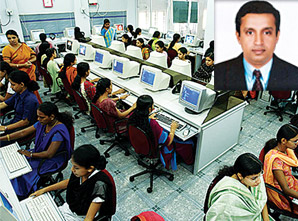
Dr Jayasankar Prasad,
Director, Kerala State IT Mission
“The long term focus of KSITM will be on creating an integrated e-Gov platform wherein the services provided by various government departments and agencies will get integrated into an unified system,” says Dr Jayasankar Prasad, Director, Kerala State IT Mission

Please give us an overview of the ways by which KSITM is facilitating the development of e-Governance in the state of Kerala. What is the vision under which KSITM has been created by the state government?
Kerala State Information Technology Mission (KSITM) was formed as a nodal agency for implementation of the various initiatives under the IT department. KSITM has been piloting various IT related and IT enabled services /projects in the state since its inception in 1999. The mission has successfully undertaken the e-Governance initiatives in the state and has kept the state at par with other states in India.
In your opinion what are the most landmark projects undertaken by KSITM? What kind of response are your e-Governance projects seeing from the common citizens?
The most prominent of the project undertaken by KSITM over the years are the State Data Centre, Kerala State Wide Area Network (KSWAN), e-Krishi, e-Procurement, State Service Delivery Gateway (SSDG), Mobile Service Delivery Platform, Sutharya Keralam, Digital Workflow System, Entegramam – My Village, Fast Reliable Instant Effective Network for Disbursement of Services (FRIENDS), Service and Payroll Administrative Repository for Kerala (SPARK), etc. Though the efforts made in e-Enabling the government departments have resulted in the creation of standalone back-ends, digital work flows and service delivery channels, the expectations of the citizens, connected with e-Government, a “one government view” has not been metfully. KSITM today focusses on consolidating and integrating the various applications and systems across the government to ensure a seamless delivery of services to the citizen. The long-term focus of KSITM will be on creating an integrated e-Gov platform wherein the services provided by various government departments and agencies will get integrated into an unified system. The intention is to make all government interactions, information and transaction services, available electronically through a single access point, for all the users (citizens, CSC operators, government employees, resident and non resident Keralites, visitors and business). The integration and standardisation and consolidation of all government systems, infrastructure and processes is a vital step in that direction. This in turn will lead to increased availability, accessibility, productivity and effectiveness of electronic delivery of public services, increases the efficiency of the government and also trustworthiness, transparency, traceability, security and privacy of data.

The state of Kerala has implemented Akshaya for bridging the digital divide. How effective is this initiative being at the ground level? What is the situation of digital divide in the state?
Akshaya is acting as an agency to bridge the digital divide and for delivery of services to the door step of the citizen as a friendly face of the government. Akshaya network with more than 2000+ Akshaya Centres is available all across the state at the rate of two per panchayat. It is ubiquitous,networked, competent and scalable to deliver all sorts of citizen services. Kerala with its high literacy and ICT penetration has bridged the divide to a great extent and the well spread out Akshaya centres which is a unique network of local entrepreneurs is playing its part in the scheme of things.
Majority of India still speaks in local languages. What steps are you taking to ensure that there is support for Malayalam language in e-Governance systems?
The flavour of the mother tongue and the need to provide requisite information and services using the official language led to the project called Malayalam computing. This is an initiative for creating capacity and content in the local language, Malayalam. The broad objectives of the project are to strengthen local language, Malayalam, using the possibilities provided by Information and Communication Technologies and to address the linguistic barrier which prevents the people of Kerala from tapping the new technologies. Government departments are encouraged to use the Malayalam fonts/language for communication even through the digital media, interfaces for the same are available in the digital file flow systems and applications. Further developments in the area of mobile based Malayalam computing, etc. are in the pipeline.
Security is an area of concern for every online system, with incidences of hacking being on the rise. What steps is KSITM taking to ensure that the e-Governance systems, where lots of private information on the citizens are stored, are being kept up to date?
Government of Kerala felt the need for setting up of Computer Emergency Response Team-Kerala (CERT-K) to actively coordinate with CERT-India (CERT-IN) to ensure cyber security in the state and the team works as a special project of the KSITM. The team looks into awareness creation, security audits and proactive and reactive measures with respect to cyber threats on the government websites and applications
Be a part of Elets Collaborative Initiatives. Join Us for Upcoming Events and explore business opportunities. Like us on Facebook , connect with us on LinkedIn and follow us on Twitter, Instagram.












